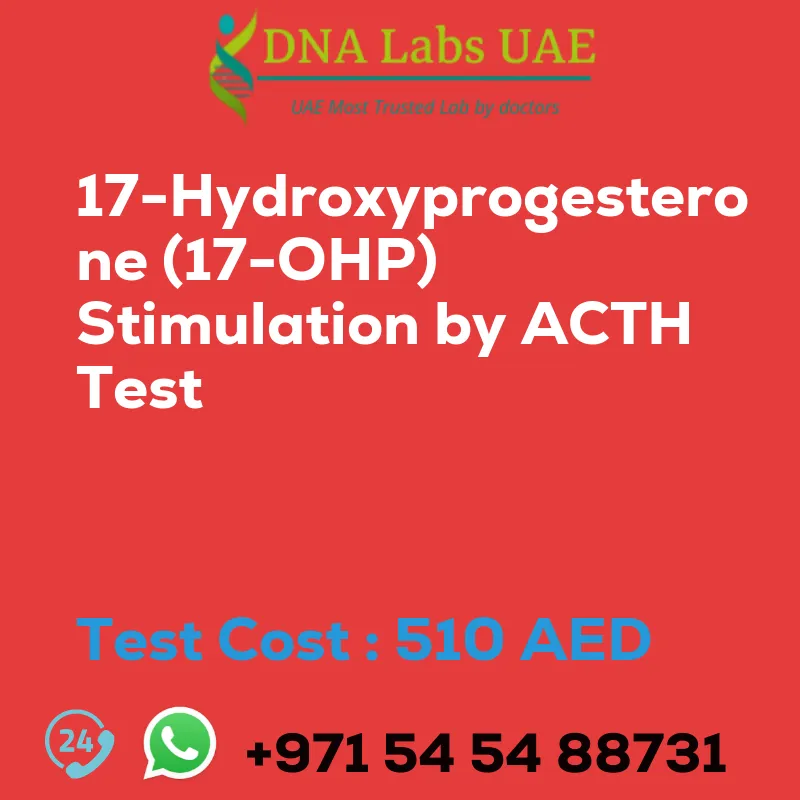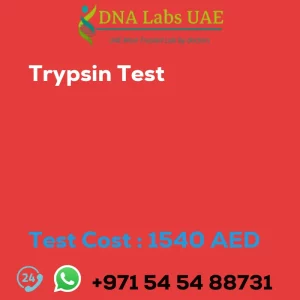17-HYDROXYPROGESTERONE 17Æ’??OHP STIMULATION BY ACTH Test
Test Name: 17-HYDROXYPROGESTERONE 17Æ’??OHP STIMULATION BY ACTH Test
Components: Price 510.0 AED
Sample Condition: 2 mL (0.5 mL min.) serum from 1 SST for each timed specimen. Draw fasting early morning baseline sample between 8-10 am; administer 250 ug of synthetic ACTH (Synacthen) IV, draw additional sample at 60 min. Ship refrigerated or frozen. Both tubes must be clearly marked with time drawn. Submit both tubes with one test request form.
Report Delivery: 1 week
Method: Radioimmunoassay
Test type: Disorders of Adrenal Gland
Doctor: Endocrinologist, Pediatrician
Test Department:
Pre Test Information: Overnight fasting is mandatory. First basal sample will be taken between 8-10 am. For menstruating females, sample should be given in first 10 days of the menstrual cycle.
Test Details:
The 17-Hydroxyprogesterone (17-OHP) stimulation by ACTH test is a diagnostic test used to evaluate the function of the adrenal glands, specifically the production of cortisol and other steroid hormones. During the test, a baseline blood sample is taken to measure the level of 17-OHP. Then, a synthetic form of adrenocorticotropic hormone (ACTH) is administered either by injection or through an IV infusion. ACTH stimulates the adrenal glands to produce cortisol and other hormones. Additional blood samples are taken at specific time intervals after the ACTH administration to measure the levels of 17-OHP. These measurements help determine how well the adrenal glands are responding to the ACTH stimulation.
This test is commonly used to diagnose and monitor conditions such as congenital adrenal hyperplasia (CAH), which is an inherited disorder that affects the production of cortisol and other hormones. It can also be used to assess adrenal function in cases of suspected adrenal insufficiency or adrenal tumors.
Interpretation of the test results is based on the levels of 17-OHP measured at different time points. Abnormal results may indicate adrenal gland dysfunction or other underlying conditions that affect hormone production. It is important to consult with a healthcare provider for a proper interpretation of the test results and further evaluation if needed.
| Test Name | 17-HYDROXYPROGESTERONE 17Æ’??OHP STIMULATION BY ACTH Test |
|---|---|
| Components | |
| Price | 510.0 AED |
| Sample Condition | 2 mL (0.5 mL min.) serum from 1 SST for each timed specimen. Draw fasting early morning baseline sample between 8-10 am; administer 250 ug of synthetic ACTH (Synacthen) IV, draw additional sample at 60 min. Ship refrigerated or frozen. Both tubes must be clearly marked with time drawn. Submit both tubes with one test request form. |
| Report Delivery | 1 week |
| Method | Radioimmunoassay |
| Test type | Disorders of Adrenal Gland |
| Doctor | Endocrinologist, Pediatrician |
| Test Department: | |
| Pre Test Information | Overnight fasting is mandatory.First basal sample will be taken between8-10 am. For menstruating females, sample should be given in first 10 days of the menstrual cycle. |
| Test Details |
The 17-Hydroxyprogesterone (17-OHP) stimulation by ACTH test is a diagnostic test used to evaluate the function of the adrenal glands, specifically the production of cortisol and other steroid hormones. During the test, a baseline blood sample is taken to measure the level of 17-OHP. Then, a synthetic form of adrenocorticotropic hormone (ACTH) is administered either by injection or through an IV infusion. ACTH stimulates the adrenal glands to produce cortisol and other hormones. Additional blood samples are taken at specific time intervals after the ACTH administration to measure the levels of 17-OHP. These measurements help determine how well the adrenal glands are responding to the ACTH stimulation. This test is commonly used to diagnose and monitor conditions such as congenital adrenal hyperplasia (CAH), which is an inherited disorder that affects the production of cortisol and other hormones. It can also be used to assess adrenal function in cases of suspected adrenal insufficiency or adrenal tumors. Interpretation of the test results is based on the levels of 17-OHP measured at different time points. Abnormal results may indicate adrenal gland dysfunction or other underlying conditions that affect hormone production. It is important to consult with a healthcare provider for a proper interpretation of the test results and further evaluation if needed. |








